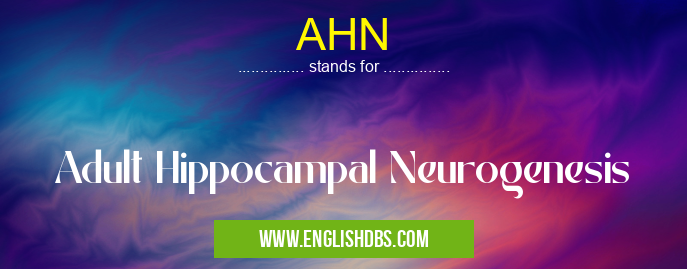What does AHN mean in UNCLASSIFIED
Adult Hippocampal Neurogenesis (AHN) refers to the generation of new neurons in the hippocampus, a brain region crucial for learning and memory. Once thought to occur only during embryonic development, AHN has been found to persist in adulthood in various species, including humans.

AHN meaning in Unclassified in Miscellaneous
AHN mostly used in an acronym Unclassified in Category Miscellaneous that means Adult Hippocampal Neurogenesis
Shorthand: AHN,
Full Form: Adult Hippocampal Neurogenesis
For more information of "Adult Hippocampal Neurogenesis", see the section below.
_Introduction_
Mechanism and Significance
AHN involves the proliferation of neural stem cells in the subgranular zone of the dentate gyrus, a region within the hippocampus. These stem cells differentiate into new neurons, which migrate and integrate into the existing neuronal network. AHN contributes to cognitive functions, such as:
- Memory formation and consolidation: New neurons are involved in the formation of new memories and the strengthening of existing ones.
- Learning and adaptation: AHN enables the hippocampus to adapt to new environments and learn new tasks.
- Mood regulation: Dysregulation of AHN has been linked to mood disorders such as depression and anxiety.
Factors Influencing AHN
Various factors can influence AHN, including:
- Exercise and physical activity: Regular exercise promotes AHN.
- Stress: Chronic stress can inhibit AHN.
- Diet: A balanced diet supports AHN.
- Environmental enrichment: Exposure to stimulating environments enhances AHN.
Implications for Health and Disease
Understanding AHN has implications for various health conditions:
- Cognitive decline: Impairments in AHN have been associated with age-related cognitive decline and neurodegenerative diseases like Alzheimer's.
- Mood disorders: Dysregulated AHN may contribute to the development of mood disorders.
- Brain injury: AHN may play a role in the recovery process after brain injury.
Conclusion
Adult Hippocampal Neurogenesis (AHN) is a crucial process that contributes to cognitive functions, including learning, memory, and mood regulation. Understanding AHN provides insights into brain development, cognitive health, and potential therapeutic interventions for neurological and psychiatric disorders. Ongoing research aims to elucidate the mechanisms and applications of AHN in promoting brain health and treating brain-related conditions.
Essential Questions and Answers on Adult Hippocampal Neurogenesis in "MISCELLANEOUS»UNFILED"
What is Adult Hippocampal Neurogenesis (AHN)?
AHN is the process by which new neurons are generated in the hippocampus, a brain region crucial for memory and learning. These newly generated neurons integrate into existing neural circuits and contribute to cognitive function.
Where does AHN occur in the brain?
AHN primarily occurs in the dentate gyrus of the hippocampus, a subregion involved in the formation of new memories. New neurons are generated from neural stem cells located within the dentate gyrus.
What factors influence AHN?
Various factors can influence AHN, including:
- Environmental enrichment: Enriched environments, such as those with exercise and social interaction, promote AHN.
- Exercise: Regular physical activity has been shown to increase the rate of AHN.
- Stress: Chronic stress can inhibit AHN.
- Age: AHN declines with age, contributing to age-related cognitive decline.
What is the role of AHN in memory and learning?
AHN is believed to play a crucial role in forming new memories and improving cognitive function. New neurons generated through AHN integrate into the neural circuitry of the hippocampus, contributing to the encoding and retrieval of memories.
Can AHN be affected by lifestyle choices?
Yes, lifestyle choices can impact AHN. Engaging in activities such as exercise, pursuing cognitive challenges, and maintaining a healthy diet can promote AHN and support cognitive well-being.
AHN also stands for: |
|
| All stands for AHN |
